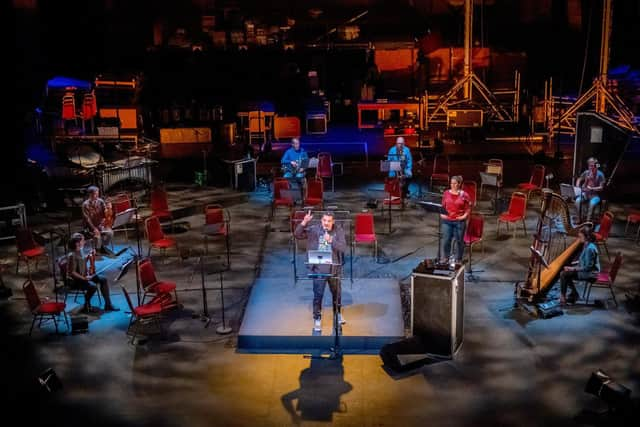Yorkshire has many great theatre companies and venues and the most thriving arts and cultural industry outside of London


It was the question I found myself facing following a performance of Northern Ballet’s Geisha at Leeds Grand Theatre on March 14, 2020.
Who could have predicted it would be the last live performance Northern Ballet would stage that year? It wasn’t the last live theatre I saw in 2020 – I managed to squeeze in a visit to the Leeds Playhouse for Krapp’s Last Tape and Orpheus in the Record Shop in October during the lockdown hiatus – but that performance of Geisha was the last I saw before British theatre changed forever. Within two weeks, the first UK-wide lockdown was announced.
Advertisement
Hide AdAdvertisement
Hide AdThe theatre world hasn’t quite yet emerged from the pandemic, blinking into the sunlight, but is starting to peer optimistically at a light ahead.


With that in mind, the hope is that somewhere near normal service will be resumed in the coming weeks and I’ll be able to start writing about shows that you’ll actually be able to see, coming, as the old phrase goes, to a venue near you soon.
It seemed odd, though, to leave behind over a year’s worth of theatre profiles without pausing to reflect.
On March 13, 2020 these pages carried an interview I did with Tom Bateman about the actor taking on the lead role in Coriolanus at Sheffield Crucible. One week later the production was put on ice and we had started running lockdown profiles of the theatres and companies we have in the region.
Advertisement
Hide AdAdvertisement
Hide AdNewspapers of course are not immune to the effects of a pandemic and there was definitely a question over whether or not we could justify continuing our coverage with Culture while the arts sector went into a near total lockdown.


Sometimes you need to do the right thing and abandoning our coverage of the arts during the most difficult period it had ever faced was simply not an option.
But I still faced the question: what do I write about, every Friday, while the theatre world lay dormant?
We are unbelievably blessed in our part of the world to have the most thriving arts and cultural industry outside of London. Our size as a region helps us in being such a leader, of course, but it’s more than that.
Advertisement
Hide AdAdvertisement
Hide AdWe have an energy in Yorkshire’s cultural world that emanates from our unique combination of world-beating venues, theatre companies and artists.
The answer to the question of what to write about was obvious: I’d use this pause as an opportunity to drill into the landscape, look at the parts that makes Yorkshire so powerful and through focussing one week at a time on some of the many parts that make up the whole, maybe reveal some greater truths.
The lockdown profile series, as I christened them, began in March last year, with a look at the exceptional Slung Low. Led by artistic director Alan Lane, the theatre company based in Holbeck, South Leeds, is the little company that could.
When the pandemic put on pause the creation of creative work, Slung Low got creative and pivoted their output to become a foodbank hub for the people of South Leeds.
Advertisement
Hide AdAdvertisement
Hide AdProjects followed, with lamppost galleries and outdoor theatre, but it was the direct response to the pandemic of this ambitious theatre company that seemed like an obvious starting point for our profiles.
It spoke to something wider about the arts, about the humanity of those who ply their trade therein, it spoke to the endless invention and reinvention the creative industries best can demonstrate and to why the profiles I was about to spend a year writing were worthwhile.
I kept a list. I won’t replicate the whole list here, but as well as the obvious venues like Stephen Joseph Theatre, Sheffield Crucible and Leeds Playhouse, I included Bradford’s Kala Sangam, Marsden’s Mikron, Hull’s Middle Child, Sheffield’s Third Angel and Bradford’s Buglight.
I got from March to December last year without a second thought. Truly, I was able to list the theatres and companies that would provide enough material for ten months worth of profiles almost without having to think about it and the last four months have hardly been challenging.
Advertisement
Hide AdAdvertisement
Hide AdI didn’t even get around to profiling Unlimited Theatre, or the underground open mic night at Leeds’s Sela Bar run by Rheima Robinson.
I never got to Seven Arts in Chapel Allerton or the Grand Opera House in York, or any number of up and coming companies around the region. We are awash with theatrical talent in God’s Own Country.
There are a number of patterns I’ve spotted while writing the profiles. The most obvious one is the connections between the arts world is an integral part of our success.
I was once told that ‘journalism is a contact sport’ – the same clearly applies to the arts; the industry in Yorkshire is run on the goodwill of those involved in it towards each other.
Advertisement
Hide AdAdvertisement
Hide AdTheatre in the Mill giving space to the likes of Rash Dash and Paper Birds when they were starting out, Sheffield Crucible providing a home for Eclipse theatre: there are a lot of people in the Yorkshire theatre industry who fully understand the symbiotic relationship they have with the landscape in which they are involved and fully participate.
Creativity was a resource I found in plentiful supply – hardly surprising – but it was surprising just how creative some of the companies were in the face of the pandemic, embracing technology, performing in car parks, entirely changing what a company does; the creativity was boundless.
But the thing that resonates most is the pride. Of course we’re proud, we’re Yorkshire, but the pride in the work these places and people create and host rang out loud in each profile I’ve brought to these pages each week over the past year, and the pride was entirely justified.
Like I say, we’re awash. Now that the light at the end of the tunnel is in sight, we must support the creative industry when it takes its place back in the spotlight.